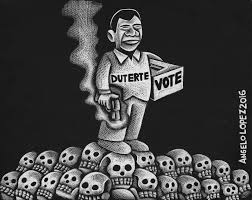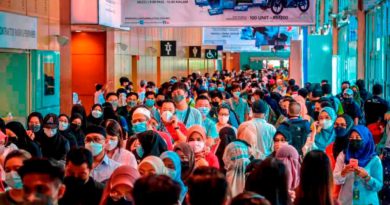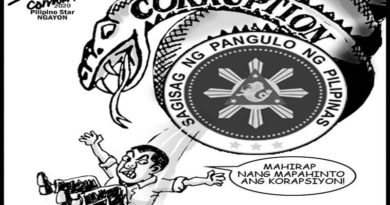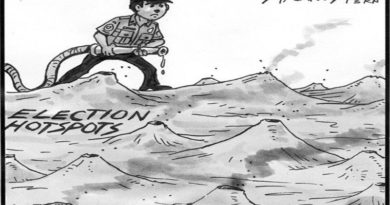OP ED COLUMN: OPINION ON PAGE ONE- What are your worst fears, what are your best hopes? – BY FRANCISCO S. TATAD
THIS was the question I put to Sen. Antonio Trillanes 4th in his Senate office on Wednesday afternoon, where he has been staying ever since President Rodrigo Duterte announced the “revocation” of his amnesty from President B. S. Aquino 3rd in 2011, and ordered his arrest for the crimes of rebellion and coup d’etat, committed in 2003, 2006 and 2007 against the Macapagal Arroyo government, but dismissed by the courts pursuant to the executive grant.
.
– SPACE RESERVE FOR YOUR ADVERTISEMENT –
A man unafraid
Despite the unending flow of visitors wanting to speak to him, and the phalanx of TV cameras and cameramen standing outside his office, Trillanes looks confident and relaxed, in good humor and at peace. He is facing the most awesome powers of the presidency, and he suspects DU30 will not mind seeing him “terminated with extreme prejudice” if the situation gets worse. But he does not doubt the justness of his cause. He has overcome all fears and is a man unafraid. He has no doubt the Constitution, the law and history are on his side, and he is buoyed up by his growing support in the media and on the street. This tends to translate directly into diminishing support for the President.
There are, however, conflicting developments.
On Tuesday, the Supreme Court denied Trillanes’ petition for a temporary restraining order (TRO) or writ of preliminary injunction against the implementation of DU30’s Proclamation 572 which seeks to void the amnesty granted to him by Aquino under Proclamation 75.
– SPACE RESERVE FOR YOUR ADVERTISEMENT –
.
Solicitor General Jose Calida said there is no longer any impediment to arresting the former Navy lieutenant turned senator for his participation in the Oakwood mutiny in Makati in 2003, the Marines standoff in Taguig in 2006, and the Peninsula Hotel siege in Makati in 2007 against the Macapagal Arroyo government.
DU30’s assurances
The SC spokesperson explained that, in denying the plea, the court took into account DU30’s “categorical pronouncement that Trillanes will not be apprehended, detained or taken into custody unless a warrant of arrest has been issued by the trial court.” Secondly, since DU30’s “revocation” of Trillanes’s amnesty is based on his alleged failure to apply for it, and to admit guilt for his offenses—allegations denied by Trillanes and contradicted by the documentary evidence—the court decided to let the Makati Regional Trial Courts 148 and 150 review the cases they had earlier dismissed.
This gives Trillanes reason to believe he runs no risk of being arrested by DU30’s minions on the old charges, which had long been extinguished. Defense Secretary Delfin Lorenzana says without an arrest warrant from the proper court, Trillanes cannot be arrested. In any case, Article VI Section 11 of the Constitution provides that “no senator or member of the House of Representatives shall, in all offenses punishable by not more than six years imprisonment, be privileged from arrest while Congress is in session.”
.
The RTC judges may want to be seen as more independent and courageous than many of the SC justices who recently took the law into their own hands when they voided, ab initio, the six-year-old appointment of their own Chief Justice Ma. Lourdes Sereno in a quo warranto proceeding, without a word from the Constitution, and solely at the prompting of an angry President. An attempt to impeach seven of these justices has just failed after the House committee on justice threw out the complaint against them for not being sufficient in substance. This earned a sharp rebuke from Albay’s Rep. Edcel Lagman, who said the complaint was overriding in substance, but political partisanship was more ascendant.
Moving on
We need to move on. But to do so, we must resolve the core issue, which revolves around the validity of the two contradictory proclamations. Which one is void, and which is not? The SC must rule on this question. The Constitution is clear enough; it leaves no room for obfuscation. It grants the President the power to grant amnesty with the concurrence by a majority of all the members of Congress; without that concurrence, no amnesty is possible. But can one president revoke an amnesty granted by another for reasons of his own? Can he do so without the concurrence of Congress? And can he invalidate the concurrent act of Congress? That is the core question.
DU30’s move to void Aquino’s amnesty was earlier premised on the allegation that Trillanes had failed to apply for it and to admit guilt for his offenses. Trillanes has disproved this allegation with a preponderance of documentary evidence. But DU30 has since amended his position to say it was in fact then Defense Secretary Voltaire Gazmin rather than President Aquino who amnestied Trillanes and all the others. If this is true, then the amnesty to all the other 38 military officers and 53 enlisted men aside from Trillanes would indeed be invalid.
Aquino’s legal spokespersons insist that in 2010 Aquino granted amnesty to a certain class of offenders by issuing Proclamation 75; Trillanes and company then applied for it and admitted guilt for their offenses in order to qualify for it. Gazmin’s role, according to them, was solely as processing officer; but the amnesty was granted by Aquino himself. The amnesty records under other presidents tended to show that the same formula and procedure were followed in the past.
DU30’s legal point
In his so-called “tête-à-tête” (French for “head to head”) with his presidential legal counsel Salvador Panelo on Tuesday, DU30 insisted that Gazmin approved the amnesty himself rather than merely processing the amnesty applications of the officers and men. This is not half as forgettable as the original allegation that Trillanes had failed to apply for the program and failed to admit guilt for his offenses, as required by law. This raises a serious justiciable question, affecting not only Trillanes, but all the 38 other officers and 53 enlisted men. DU30 cannot single out Trillanes alone, while saying nothing about the others. This makes the problem infinitely much bigger. The court may have to rule the amnesty invalid, if it finds that it was, in fact, Gazmin who approved it rather than the President.
But voiding the 2010 amnesty for that very reason would not validate DU30’s own proclamation, without the concurrence of a majority of all the members of Congress. This could leave us with two invalid proclamations, and a group of former military officers and men who would have lost their post-amnesty status through no fault of their own. This is not a desirable situation for a president who is already worried sick about real or imaginary plots to bring him down.
Given such situation, which could only aggravate wounded feelings within the military, I would ask DU30 to carefully and prudently consider a completely unexpected move. Instead of insisting on the invalidity of Aquino’s amnesty proclamation and going after its beneficiaries for the past seven years, I would urge him to do the exact opposite. On the assumption that the 39 officers and 53 men had availed of the 2010 amnesty in good faith, I would urge DU30 to issue a fresh amnesty to the same officers and men, with the full concurrence of Congress!
In chess this would be called a brilliancy, worthy of the greatest international grandmasters.
 All photographs, news, editorials, opinions, information, data, others have been taken from the Internet ..aseanews.net | [email protected] |.For comments, Email to :D’Equalizer | [email protected] | Contributor
All photographs, news, editorials, opinions, information, data, others have been taken from the Internet ..aseanews.net | [email protected] |.For comments, Email to :D’Equalizer | [email protected] | Contributor










